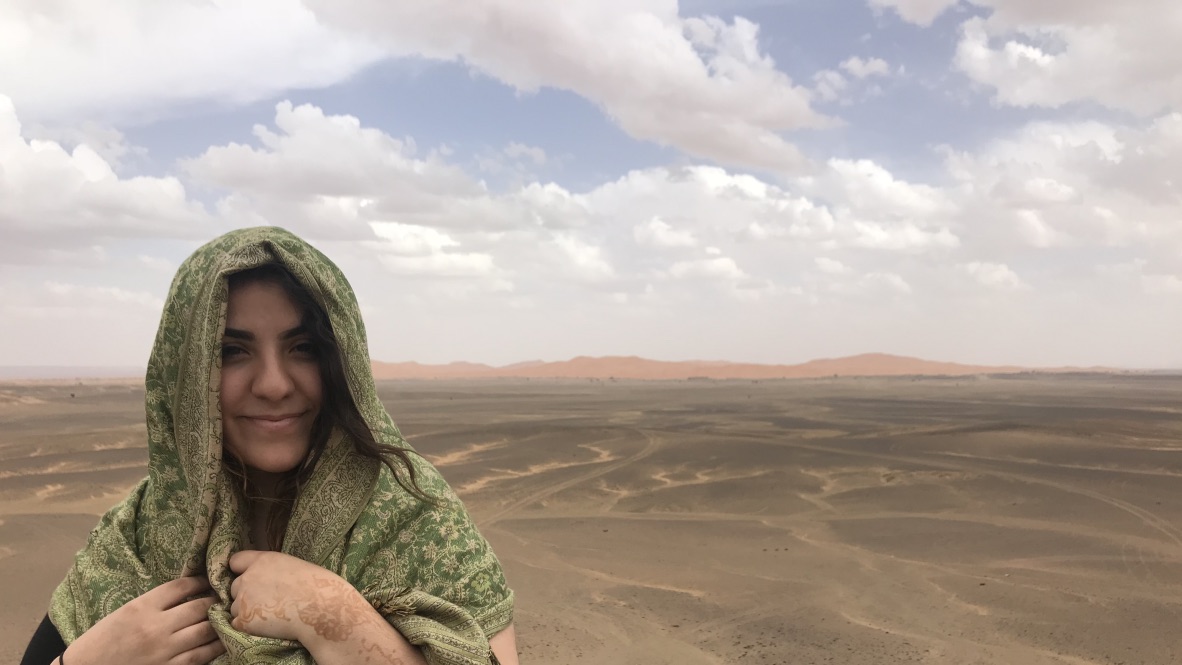Hannine was sitting in her first language class at MSU when she realized she’d made the wrong decision. She’d enrolled in French class as a freshman because it seemed like the natural choice after studying the language throughout high school. On that first day, though, she realized she was finally ready to learn the language she’d been avoiding most of her life: Arabic.

Though both of Hannine’s parents immigrated to the United States from Palestine, she had never wanted to learn Arabic. “I was embarrassed by my culture,” she admits. Growing up in a small town with little diversity, she understood the stigma she faced as an Arab and a Muslim in the United States from a young age. Learning Arabic would only further ostracize her, she feared, so she stuck with English. “I wanted to be as American as possible.” It was on a trip to Palestine visiting her extended family in high school that she realized the consequences: being unable to communicate with her cousins, aunts, and uncles was really frustrating. So that summer, Hannine started to teach herself Arabic—she learned the alphabet and picked up vocabulary from the people around her. It wasn’t until starting school at Michigan State though that she had the opportunity to really learn the language.
Since the day she enrolled in Arabic 101, Hannine says, her life has changed dramatically. “Learning the language transformed who I am.” Last summer, she spent two months in Morocco on a language-intensive study abroad where she improved her speaking, as well as her understanding of the language in connection to the culture and religion she’d avoided in the past. Instead of hiding from her culture, Hannine was learning to embrace it. “Through learning Arabic, I learned that I don’t want to forget my roots.”

Painting the Rock at MSU.
One of the most tangible effects of Hannine’s language learning journey was the community it helped her build, especially at Michigan State. Most of her friends come from Arabic classes or the Palestinian student group, SUPER, which she joined after taking her first language class. Having embraced her own identity after years of avoidance, Hannine is now speaking up for others: the group’s events advocate for Muslims, and they also partner with other marginalized groups who face discrimination in the United States and around the world. Activism has become a part of Hannine’s identity, and she credits the new passion to her learning Arabic: “I don’t think I ever would’ve done this a year ago.”

Teaching African Immigrants in Morocco about public health.
Hannine plans to go to medical school after college, so her next goal with Arabic is to learn more medical terminology that could help her as a doctor whether she chooses to work in the U.S. or abroad. Though she’s almost completed her Arabic minor, leaving the language behind is not an option anymore. “Me speaking Arabic is my whole identity—I don’t know who I am without having learned Arabic.” Her continued desire to learn more of the language seems like it could be destiny: in Arabic, Hannine translates to “longing for”; her last name, “knowledge.” Her story shows that not only does language learning have the power to radically transform lives, but that only one simple thing is needed to begin: a longing for knowledge.
Story by Katherine Stark.



